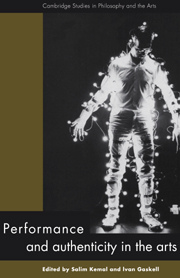Book contents
- Frontmatter
- Contents
- List of Contributors
- Editors' Acknowledgments
- 1 Performance and authenticity
- Part I Performance, religion, and authenticity
- Part II Understanding, performance, and authenticity
- Part III Authenticity, poetry, and performance
- 10 Inauthenticity, insincerity, and poetry
- 11 Poetry's oral stage
- 12 True stories: Spalding Gray and the authenticities of performance
- Index
11 - Poetry's oral stage
Published online by Cambridge University Press: 12 November 2009
- Frontmatter
- Contents
- List of Contributors
- Editors' Acknowledgments
- 1 Performance and authenticity
- Part I Performance, religion, and authenticity
- Part II Understanding, performance, and authenticity
- Part III Authenticity, poetry, and performance
- 10 Inauthenticity, insincerity, and poetry
- 11 Poetry's oral stage
- 12 True stories: Spalding Gray and the authenticities of performance
- Index
Summary
One of the most famous of modern poetry readings took place at the Six Gallery in San Francisco on October 13, 1955. To help launch the new gallery, an artists' co-op newly converted from a commercial garage, the poet Michael McClure, a friend of the organizers, arranged for six poets to read, and one of them, Kenneth Rexroth, then opted to act as master of ceremonies. The other five, Philip Lamantia, Philip Whalen, Michael McClure, Gary Snyder, and Allen Ginsberg, already formed a distinct group soon to be widely known as the Beat poets. About a hundred people turned up, and as the readings began, another writer, Jack Kerouac, who had been invited to read but was apparently too shy to do so, collected money for jugs of wine and then passed them around, becoming drunk and excitable himself and encouraging the audience to throw themselves noisily into the spirit of things. By the time Allen Ginsberg began reading his new, unpublished poem Howl, the audience were already very receptive. Ginsberg describes what happened then: “I gave a very wild, funny, tearful reading of the first part of ‘Howl.’ Like I really felt shame and power reading it, and every time I'd finish a long line Kerouac would shout ‘Yeah!’ or ‘So there!’ or ‘Correct!’ or some little phrase, which added a kind of extra bop humor to the whole thing. It was like a jam session, and I was very astounded because ‘Howl’ was a big, long poem and yet everybody seemed to understand and at the same time to sympathize with it.”
- Type
- Chapter
- Information
- Performance and Authenticity in the Arts , pp. 215 - 253Publisher: Cambridge University PressPrint publication year: 1999



